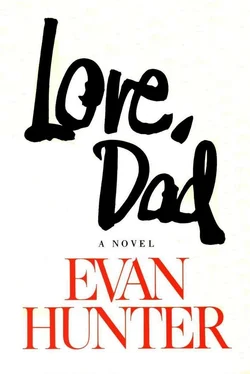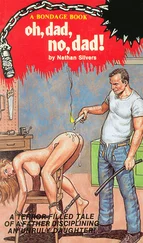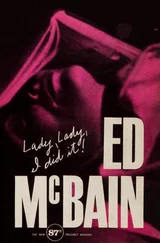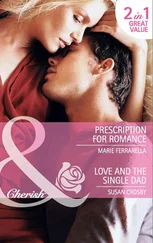He did not recognize her at first.
This could not be... this was not his daughter.
The snow was falling behind her. She stood just outside the door with a tentative smile on her face, illuminated by the globe to the right of the door, slanting down onto cheekbones that were higher than he remembered them, deeper hollows beneath them than he remembered, her face altogether thinner than he remembered, her hair stringy and oily, plastered to her skull, an Indian band, American Indian, across her forehead — she looked sallow and dirty, this was not his daughter. She was barefooted. There was snow banked eighteen inches high in the front yard, but she was barefooted. The temperature outside was thirty-four degrees Fahrenheit, but her feet were naked and dirty below the hem of the tent dress patterned with lilies of the valley. She was wearing a leather fleece-lined jacket. The jacket was unzipped and open. Beneath it, he could see a black velvet vest.
“Dad?” she said.
He took her into his arms. He was too crushed by the weight of the moment to find the strength to call to his wife upstairs, too overwhelmed by the sudden tears in his eyes to call up to her where she was applying her lipstick at the bathroom mirror, too suddenly relieved and grateful and tremblingly weak to inform his wife that their daughter was home, their daughter was at long last home. He held Lissie close, he kissed her hair, he kissed her face, her nose, her cheeks, he said, “Lissie, Lissie,” and only then did he find the voice to shout, exuberantly, “Connie! She’s home!”
At the breakfast table on New Year’s Day, Lissie casually mentioned that she was infested with crabs, and that maybe they should all get something to wash with or whatever, because they’d all been doing a lot of hugging and kissing the night before. Jamie went immediately to the phone and called Harry Landau, who’d been their family physician ever since they’d moved to Rutledge. It was 1:00 P.M. but Harry was still asleep. Alice Landau asked if this was an emergency. Jamie said No, it wasn’t, but he’d appreciate it if Harry could get back to him as soon as possible. Harry returned the call at two-thirty.
“Happy New Year,” he said.
“Happy New Year,” Jamie said. “I need some help, Harry.”
“What with? A hangover?”
“I only wish. Crabs,” Jamie said.
“Crabs?”
“Yeah. And head lice, too.”
“Where you been sleeping, Jamie?” Harry said, and laughed.
“Well, it’s—” He felt suddenly embarrassed. Crabs were associated with... well... with sexual intercourse. He felt suddenly as if his daughter had come home from India with a venereal disease. “What should we do for them, Harry?”
“Put ’em on a long leash, and take ’em for a walk,” Harry said, and laughed again. “Are you serious about this?”
“I am,” Jamie said.
“Crabs,” Harry said, and Jamie could visualize him shaking his head. “Well, here’s what you do.”
What you did, Jamie discovered, was you went to the Rutledge drugstore for two bottles of lotion (one for Lissie, one for himself and Connie) only to learn that the drugstore was closed on New Year’s Day, and then what you did was you drove to the Talmadge alternate listed on a card hanging in the window, and you listened to the Talmadge pharmacist warning you about getting any of this stuff in your eyes, “Because what it is, you see, is an insecticide, you understand? I mean, this is just as strong as anything you’d go spraying on a cockroach or a spider, you understand? I mean, those are insects you’ve got crawling around on your body, and if you want to get rid of ’em you’ve got to use an insecticide. So be careful of your eyes.” Jamie itched all the way home.
The directions said that they were to apply the lotion to every patch of hair on their bodies and then wash it off the next day. In the tub the following night, vigorously scrubbing her groin, Connie said, “I haven’t had such action down here in a long time,” a comment Jamie let pass. He simply nodded and waited his turn at the tub.
The crabs, as it turned out, were the least of the joys she’d brought home from India. They did not learn until the Tuesday after her return that there was an open sore the size of a half-dollar on the instep of her right foot. Jamie rushed her over to Harry’s office that same morning. Harry glanced at the festering sore, said it looked like a cut that had got infected, examined it more carefully and told them exactly how lucky they were: the wound was on the verge of becoming gangrenous; another week or so, and Lissie might have lost the foot. In the car on the way home, Jamie dared to say, “You didn’t take very good care of yourself in India, did you?” Lissie shrugged and replied, “I got that cut in Brussels, on the way home.” Jamie was silent the rest of the way to the house, trying to understand his own feelings.
In Harry’s office, he’d initially felt only embarrassment. “You remember, Liss, don’t you, Harry? She’s just back from India, I thought you ought to take a look at that sore on her foot.” Harry scanning her from top to bottom, the realization in his eyes that here was the crab-carrier: “Yes, how are you, Lissie, good to see you.” Jamie’s embarrassment heightened by her appearance, the threadbare jeans, the unpressed blouse she’d bought in India, the black velvet vest she’d been wearing on New Year’s Eve (“Turkish,” she’d told them. “Cost only four lira”), the tattered sandals she’d insisted on wearing without stockings or socks even though there was a pus-dripping sore on her right foot and the temperature outside stubbornly refused to budge higher than eighteen degrees. The embarrassment dissipated to be replaced by fear when he learned how dangerously close to amputation her foot had been, and then anger at the thought of her allowing this to happen to herself, didn’t she know there was a foot attached to her body, hadn’t she realized the sore was badly infected, hadn’t she even thought of going to a doctor, weren’t there any doctors in India?
“Weren’t there any doctors in India?” he asked, as they went into the house.
“I told you I got it in Brussels,” she said, and hung her fighter-pilot’s jacket (“Railway Lost in London,” she’d told them, “cost only eight pounds”) on the rack in the entrance hall, and then went directly upstairs to her room.
Having her home was, in many respects, rather like not having her home. She spent a great deal of time in her room, listening to the rock-and-roll records she’d missed all the while she was abroad. “It’s like having friends you can always come back to and understand,” she told them at dinner one night. She was eating vegetables and only vegetables, and whereas she rarely told them much about her travels — she still had not revealed all the details, for example, of the Iranian border incident, or the attack of the wild dogs in Shahnur, or the “living in caves and whatnot” in the Himalayas or any of the other “many, many incredible things” that had happened to her in the eight months she’d been gone — she did tell them why she’d decided to become a vegetarian.
“It was after coming through Iran, and then Afghanistan, and Pakistan, where all we were eating day and night was this broiled mutton. Well, it suddenly occurred to me that what I was eating was sheep! I mean, this was ‘Mary Had a Little Lamb!’I was eating — and besides it tasted lousy. So I figured I could do without it entirely, I mean without the kind of meat you could get over there. But I haven’t had an urge for any other kind of meat, either, I mean I’m not desperate for a steak or a hamburger or anything like that. Besides, it makes me feel a lot cleaner inside.”
Читать дальше












